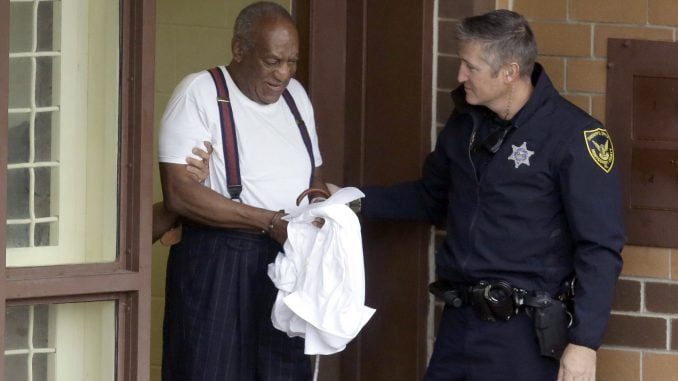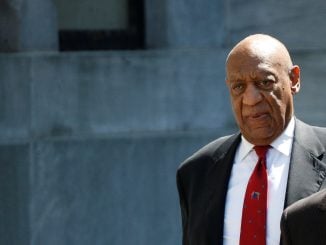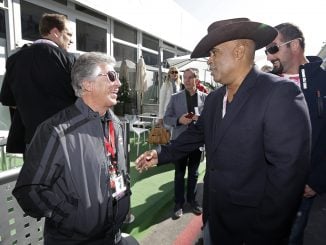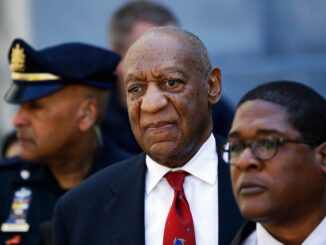
Bill Cosby is behind bars, but that doesn’t mean his sexual assault case is over.
Cosby’s lawyers are vowing to appeal his conviction, and they’ve already outlined some potential issues — from Judge Steven O’Neill’s weighty decision to let five additional accusers testify at Cosby’s retrial to new allegations that prosecutors used a doctored tape as evidence.
Still, legal experts say, any appeal is a long shot.
Appellate courts give trial judges broad discretion to make decisions affecting the outcome of a case and they overturn only a tiny fraction of convictions. Cosby would stand a better chance, experts say, if he could show that O’Neill made serious errors that violated his constitutional rights.
The prosecutors who tried Cosby say they are confident the conviction will stand.
“Bill Cosby is out of options,” said veteran Pennsylvania prosecutor Jarrett Ferentino, who wasn’t involved in the case. “His only option now is to blame the court system. His attempt to disparage and discredit his victims failed. He has every right to file an appeal. His chances of success are limited.”
The 81-year-old Cosby spent the first night of his three-to-10-year prison sentence alone in a single cell near the infirmary at a new state lock up outside Philadelphia.
Cosby, once revered as “America’s Dad” for his role as wise, kind Dr. Cliff Huxtable on “The Cosby Show,” arrived at SCI Phoenix on Tuesday to a new label: Inmate No. NN7687.
He’s allowed phone calls, visits and exercise. He could eventually be moved to general population at the facility, a mere 20 miles from the gated mansion where, a jury found, he drugged and molested Andrea Constand in 2004.
Here are some of the issues Cosby’s lawyers could argue in their appeal.
‘DOCTORED’ TAPE
In a failed, last-ditch bid to keep Cosby free on bail pending his appeal, his lawyers on Tuesday accused prosecutors of playing a doctored tape for the jury.
Cosby’s publicist said afterward that a forensic expert found that a tape Constand’s mother made of a 2005 telephone call with Cosby had been manipulated in two places and was “not an authentic recording.”
During the call, Cosby talks about a plan to pay for Constand’s education.
District Attorney Kevin Steele rejected the allegations, saying it was widely known that Gianna Constand started her recorder after the call began.
“If that’s what they’ve got, it’s beyond a Hail Mary,” Steele said.
PARADE OF ACCUSERS
The biggest difference from the first trial — which ended in a mistrial — was O’Neill’s decision to let jurors hear from five other women who say Cosby had also drugged and violated them. The judge allowed just one other accuser to testify the first time around.
The new witnesses — permitted by state law to show that a charged crime fits a larger pattern of offenses — helped prosecutors bolster what had been a “he-said-she-said” case.
“That one is front and center because he didn’t rule that way on the initial trial,” Loyola Law School professor Laurie Levenson said. “It raises the question of why is he doing so this time? Why is he trying to put his thumb on the scales of justice?”
Cosby’s lawyers blasted the women’s testimony as excessive and prejudicial, and twice demanded a mistrial over their charged rhetoric.
One woman on the witness stand pointedly called Cosby a “serial rapist” and another asked him through her tears, “You remember, don’t you, Mr. Cosby?”
Pennsylvania courts have long grappled with how many “prior bad act” witnesses to allow. Prosecutors in the Cosby case originally wanted 19 women to testify, but an appeals court could have seen that as too many.
Monsignor William Lynn, a former Roman Catholic church official, had his 2012 child endangerment conviction thrown out after 23 such witnesses took the stand.
ACCUSING THE JUDGE AND JURY OF BIAS
As sentencing neared, Cosby’s wife issued a blistering statement accusing O’Neill of “unethical behavior” and traveled to Harrisburg to file a complaint with a judicial ethics board. Camille Cosby alleged that O’Neill was biased because of an old feud he had with the prosecutor who declined to bring charges against Cosby in 2005.
Cosby’s lawyers tried to get O’Neill to step aside before the retrial, but never mentioned the feud. Instead, they suggested he was being influenced by his wife, a social worker who has described herself as an “activist and advocate for assault victims.” O’Neill declined, saying he’s “not biased or prejudiced” by her work.
Cosby’s lawyers also took issue with the makeup of the jury.
During jury selection, they accused prosecutors of illegally removing a black woman from the pool on the basis of her race and alleged that a prosecution team member said “something that was discriminatory and repulsive.”
Later, they sought to remove a juror after a rejected juror alleged he told her: “I just think he’s guilty, so we can all be done and get out of here.”
O’Neill questioned jurors in chambers and allowed the man to stay.
“STRONG BELIEFS” AND SUGGESTIVE QUESTIONING
Montgomery County Det. James Reape caused a stir when he opined from the witness stand that he had “strong beliefs” that Cosby drugged and sexually assaulted Constand.
The defense objected, and O’Neill reminded jurors that they were there for Reape’s testimony, not his personal beliefs. “Police officers, lay people, they’re not allowed to tell you their opinion,” the judge said.
Cosby’s lawyers demanded a mistrial after a prosecutor suggested that they were wrong to help star defense witness Marguerite Jackson write a statement outlining how she says accuser Andrea Constand mused about framing a celebrity.
Prosecutor Stewart Ryan repeatedly said they had “created” the affidavit. He even had Jackson demonstrate for jurors where she and two of Cosby’s lawyers were sitting as the affidavit was being written.



